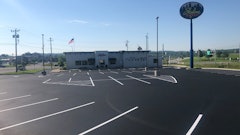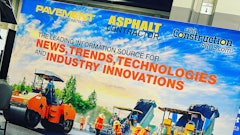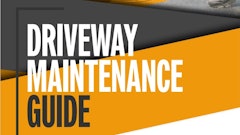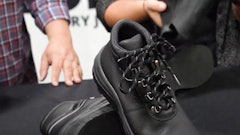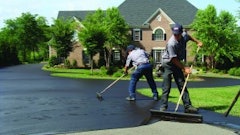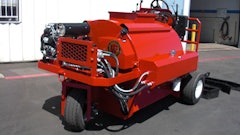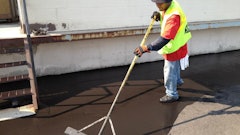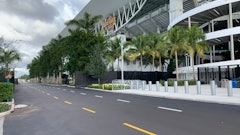
Al Harris believes in owning equipment. It's the bedrock of his 20-year-old sealcoating business, enabling his small crew to out-produce contractors with larger crews, and it's the basis of his approach to his entire pavement maintenance operation.
"We invest in equipment totally for efficiency," Harris says. "It's the key to winning many of the jobs we go after, and it's the key to being efficient. If you have the equipment you're not limited as to what you can do, so when I tell a customer we can do something, we can do it."
By owning enough equipment, and the right combination of equipment, North Suburban Asphalt Maintenance, Wheeling, IL, is able to allocate the best mix of equipment to each job, resulting in the most efficient use of equipment and labor - and greater profit. In fact, largely because of the way he uses equipment, a typical day for his small crew will involve routing and cracksealing up to 8,000 linear feet of cracks and cleaning and applying two coats of sealer on up to 250,000 sq. ft. of parking lot.
"That's about the norm," Harris says. "It's definitely more at times, but we can comfortably do 250,000 sq. ft. in a day, no problem."
Commercial work focus
Growth of North Suburban Asphalt Maintenance follows a pattern that likely looks familiar to many pavement maintenance contractors: Out of the trunk of his car Harris sealcoated driveways part time starting in 1988. In 1997 his father, Howard, joined as part of the crew and Harris added small commercial jobs, often subcontracted. Then he bought his first 1,000-gal. spray machine.
"That," he says, "was the real beginning of North Suburban Asphalt Maintenance. Ever since then the business has doubled, tripled, and even quadrupled in sales from one year to the next, and 2008 was our biggest year yet, maintenance-wise."
Harris says North Suburban Asphalt tackled what he termed "probably the biggest parking lot sealcoating job in Illinois in 2008" for Harper College as a subcontractor. In addition to cracksealing more than 15,000 linear feet of cracks over 14 parking lots, his crew sealcoated 2.6 million sq. ft. of pavement in two phases, including all ring and connecting roads throughout the college complex.
"That job had some tough parameters because they wanted two coats but they wanted at least eight hours between the coats," Harris says. "So we worked in parking lots on opposite sides, doing two one day, switching to the other side the next day, and then back to put the second coat on the first lots on day three."
In 1999 Harris hired three workers, and halfway through that season his brother, Lon, joined the crew. North Suburban ran that way until 2003 when Lon left. Rick Kaczmarski soon joined, and he is now the superintendent on the jobsite responsible for running the yard, ordering material, and directing all operations in the field, freeing up Harris to focus on sales and customer service.
Today, more than 20 years after Harris first put squeegee to driveway, North Suburban Asphalt Maintenance rarely does any residential work (with one important exception, see sidebar), devoting all its efforts to sealcoating private commercial, industrial, or multi-family residential properties or public properties such as schools and colleges.
"This area we're in is very good for commercial work. There are a lot of strip centers and shopping centers and all sorts of larger properties around here," Harris says.
Harris says the percentage of public versus private work is usually close to 50-50 but in 2008 about 75% of the work was public work. Harris says 75% of his work involves sealcoating, cracksealing, and small patching; 20% is larger patching; and the remaining 5% is other miscellaneous work including snow removal, which he got into just recently.
Today only 15% of North Suburban's work is as a subcontractor, and most of that from a couple of large-scale paving contractors who don't want to get involved in the pavement maintenance business.
"Early on I was in the field to do the work; I wasn't in the field to sell. So about 80% of our work was as a subcontractor and I'd sell the other 20% for us," Harris says. "It's better for us now because we have more control and no one makes promises we can't keep."
Harris says a few years ago North Suburban Asphalt was subcontracting patches 20 ft. x 20 ft. and larger to other contractors, but he found they were very busy and the work wasn't getting done as promptly as he wanted. So he bought a larger dump truck so he could haul more mix and handle the larger patches himself, providing better and more prompt service to his customers.
And while he doesn't pursue much work as a subcontractor he says North Suburban Asphalt generates as much as 25% of its sales by subcontracting work, usually paving and larger concrete work, to other contractors.
"Could we do it? Yes. But why? Our sealing crew is so efficient at what it does that it's cheaper and more cost-effective to do it this way," Harris says. "It's more manageable and more profitable for me to do it this way, and I can get it done at a very high level of quality."
Right equipment on each job
But it's the equipment North Suburban owns, and the crew's ability to operate it, that enables North Suburban Asphalt to produce as effectively as it does.
"If you have the equipment it's easy to get the work to keep it busy," he says. So he has the equipment including: one large dump truck, a 550 dump truck, Wacker rollers, a 200-gal. Cimline cracksealing melter/applicator, a 200-gal. SealMaster melter/applicator, two 1500-gal. sealcoating rigs, two 1000-gal. sealcoating rigs (both with spray bar and hand wand), one 550-gal. sealcoating buggy, two 8000-gal. bulk storage sealer tanks, four routers, two walk-behind concrete saws, six custom-made banding carts, and three 300-gal. squeegee buggies. He says that every year he replaces a truck and adds a piece of equipment, and every year he buys new blowers.
Whether he has one big job ahead of him or several smaller jobs, Harris makes sure he doesn't run out of anything at the jobsite. On every sealcoating job his crew takes a minimum of one spray tank and one squeegee machine. "Even on just a 50,000-sq.-ft. job we still bring the 1,500-gal. tank and a squeegee machine," he says. "The 550-gal. machine rarely goes out because we can do most jobs more efficiently with other equipment."
"Efficiency and automation is what really sets us apart from our competition," Harris says. "We have the equipment we need, we have people who know how to use it, and we know when to use it - and when not to use it."
An obvious example, he says, is sealcoating on a windy day. "You can't spray if there's a whole line of cars or buildings down wind. But because we take both a squeegee machine and a spray machine to every jobsite we can squeegee certain areas and not be slowed down at all. We aren't forced to spray a job because that's the only piece of equipment we own."
Depending on the size of the job they also bring a material truck, and he'll bring a stake truck to haul more than enough cracksealing material so he doesn't have to drive off the jobsite to replenish supplies.
"You can never take too much material to a job. You can always take too little though," he says. "When I started I had to go back and forth to get material as I ran out because I didn't have the equipment to bring everything I needed to the jobsite. That took time, it took more labor, and there was a lot of waiting around. It was not an efficient way to run a job or operate a business.
"Now I don't run out of anything. That's why my guys can do the kind of square footage we do in a day, because they have everything they need on site."
Cross-training the crew
Harris says North Suburban Asphalt Maintenance is a nine or 10-person company including himself and two office staff. That means a full-blown crew would consist of six or seven people, all of whom are cross-trained on all equipment.
"Everyone can step in where someone else was working and get the job done," Harris says. "Of course some guys operate one piece more efficiently than others, but we're talking maybe a matter of seconds or minutes, not hours."
He says cross training wasn't a planned step in the company's growth, but it's a welcome step he encouraged when he noticed production lagging on some jobs a few years back. "I asked why it took so long on a few of the jobs and I was told 'Well, this guy didn't know how to do that,' or 'this guy didn't come in so we had to teach a guy to do that.' I knew we couldn't operate that way and continue to be productive at the level we want to be at, so everyone needs to be trained on everything."
Cross-training also enables Kaczmarski to split the crew because no matter who he sends ahead to the next job they can all handle the work. Harris describes Kaczmarski as a "working superintendent." "He's definitely the heartbeat out there."
Harris says he's always eyed growth, thinking about how to get bigger and when to get bigger. But he says he finally asked himself the most important question: Why get bigger?
"I keep an eye on what's going on in my market, and I realized that a lot of companies always seemed to be having problems keeping guys busy," Harris says. "I'd talk with them and they'd always be looking for work, always saying they're not that busy.
"I keep my guys busy and I have a great working relationship with them."
Harris says most of his workers have been with him more than six years.
"But it's hard finding labor willing to make the commitment. I'm willing to pay them. In fact, I probably pay $2-plus more than my competition, plus bonuses and these are real bonuses I pay. We're not just one big happy family here. We're in business and we're working hard so they earn it and they should be paid for it."
Harris says North Suburban Asphalt Maintenance operates every non-rainy day from early May through October, working 70 to 80-hour weeks regularly without complaint.
"These guys want the hours and as long as the quality stays the same, as long as the quality stays very high, which it does, we can do it this way," Harris says.
"We have 100% commitment, which is partly what enables us to be as productive and efficient as we are," he says.
He says quite a few contractors he explains his approach to labor to don't agree with his approach.
"But I am efficient, and we are successful and profitable. We get a lot of work done, and we are able to keep our employees year after year. So it works, despite the long hours."
The Important Residential Exception
North Suburban Asphalt Maintenance schedules only one residential job a year. "It's a subdivision with 15 homes that I've been sealcoating since I started the business," says Al Harris. "The first time I bid it I told the guy 'If you give me this job now when I really need it I'll do it every year from now on for the same price.' And he did, and I have. Now with this crew we are in and out of there in a flash, not like when I used to sealcoat it myself. But when I needed the work, he was there; so I'm there for him as I promised."
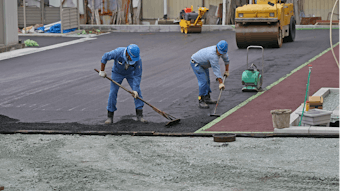


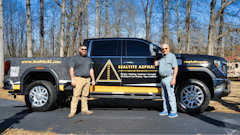
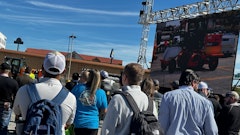
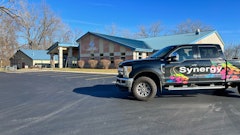
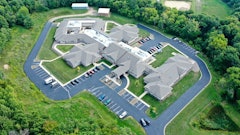
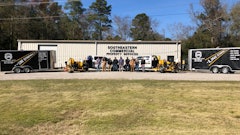




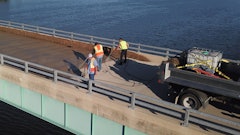



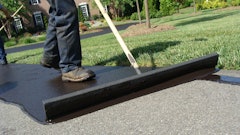
![Screen Shot 2023 01 04 At 5 23 30 Pm[35]](https://img.forconstructionpros.com/files/base/acbm/fcp/image/2023/01/Screen_Shot_2023_01_04_at_5.23.30_PM_35_.63bc42696de27.png?auto=format%2Ccompress&fit=crop&h=135&q=70&w=240)
